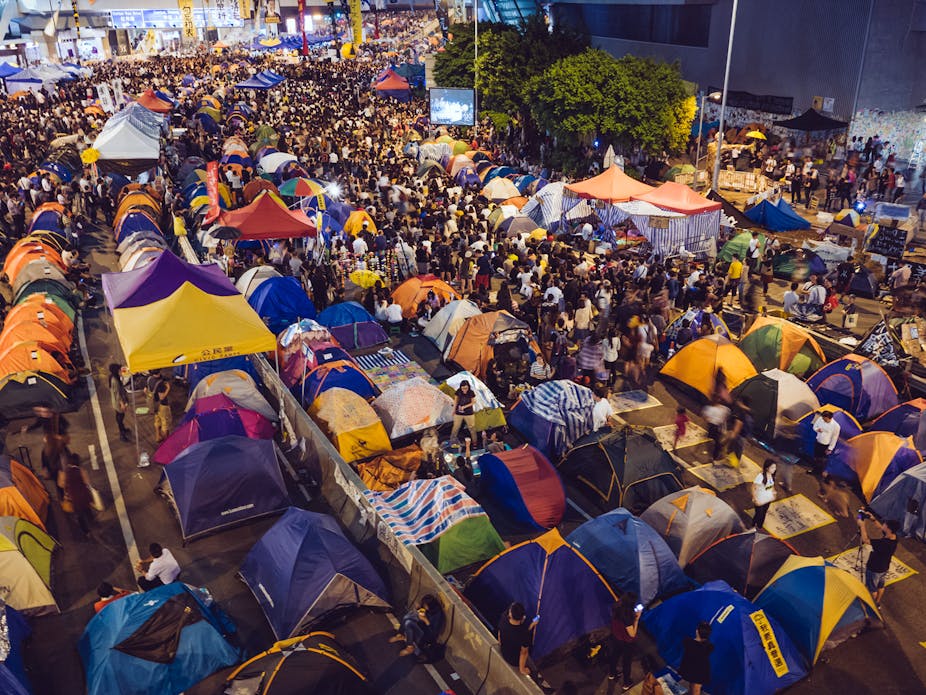The business of government is typically carried out by representatives in parliament, at local town halls or in the cabinet office, but make no mistake: politics is done everywhere, by everyone. Around the world, social and protest movements empower people to push for change from outside of established institutions. In recent years, another form of protest has been added to the familiar repertoire of community activism, marches of protest and social media campaigns: the protest camp.
From Tahrir Square in Cairo, Puerto del Sol in Madrid and Syntagma Square in Athens to New York’s Wall Street, central squares in major cities across the US and Saint Paul’s cathedral in London, urban protest camps featured prominently in the wave of uprisings that have swept the world since 2011. While protesters’ grievances and demands differed from place to place, research from around the world has found that the protest camps themselves showed striking similarities.
Amid the assembly of tents, each of these camps featured common spaces such as kitchens, libraries, learning centres, crèches and places of worship. Places of democratic deliberation and assemblies for collective discussion and decision-making were central to all camps. They often had media centres, where journalists could report about the camp, while participants produced their own media, including newspapers, radio shows and leaflets, as well as spreading their message using social media.
Putting up a fight
The camps were important symbols of protest in their own right, but out of the camps many more protest actions occurred; people started marches from the camps and retreated there after them. Within the camps, demonstrators were trained in techniques that would allow them to overcome hostile and aggressive policing. There, they could also find medical and psychological care, if they had been injured or traumatised during demonstrations.

While protest camps occur in diverse forms right across the world, each one empowers people to stay together for longer periods of time; to eat, sleep and share daily routines with fellow protesters. By providing living spaces and catering for people’s needs as they arise, protest camps differ from most other forms of protest action. They can often feel like a second home for demonstrators.
Protest camps also provide spaces to experiment with the way our daily lives are organised. In these places, political change in the form of direct democracy or gender equality are not only issued as demands by protesters – they can also be put into practice within the space of the camp.
Mounting a challenge
Since 2011, urban protest camps have regularly sprung up in cities across the world. Over that time, it has become clear that camps can enable broader political challenges, even if they initially focus on a single aim: the Kiev Maidan camp in the winter of 2013-14 and the Hong Kong Umbrella Movement both shook the political foundations of the countries where they occurred.
Similarly, the occupation of Gezi Park in Istanbul was sparked by concerns about plans to remove the green space in the heart of the city. But over time, the protests came to challenge the rule of the AKP party and its leader Erdoğan throughout the whole country. The camp helped to forge a coalition of diverse opposition groups, who historically had very little in common.
There are also numerous camps that occur on a smaller scale and address specific issues and demands, rather than initiating a wholesale questioning of the political system. Take, for example, the small camps which have occurred in response to Iceland’s Hydropower Expansion Plans since the mid-2000s.
Old dog, new tricks
Protest camps are not a new invention. Long before the Occupy movement camped out at Saint Paul’s, people gathered in camps to protest against nuclear weapons, road and infrastructure projects and war. In the 1980s, peace camps such as Greenham Common and Faslane in Scotland brought people to the gates of military facilities where nuclear weapons were kept, and formed the basis for regular blockades and protests at their gates.

They continued for an extraordinarily long time: Greenham Common lasted for 20 years and the camp at Faslane – near the UK’s Trident nuclear weapons base – celebrates its 35th birthday this year.
Yet over the past decade, activists have professionalised the camp as a form of protest, both internationally and in the UK. A broad movement against climate change, which formed in 2005, chose the protest camp as its main organisational form. Annual climate camps took place from 2006 to 2010, organised with an increasing level of sophistication and routine. More recently, protest camps against pipelines in North America – including the one against the North Dakota Access Pipeline (NoDAPL) – have brought together concerns about climate change with indigenous rights issues.
Climate camps made huge efforts to be radically democratic and ecological spaces. From plenary discussions, shared rotas for the kitchen, renewable energy supplies and compost toilets, the camps attempted to prefigure how life could be in a more just and sustainable society. By turning protest camps into temporary homes, demonstrators often form close-knit communities which sometimes helps them to network and organise in the future.
In a world where political figures like US president Trump seem keen to bypass democratic deliberation through populism, there is a desire to recreate spaces of political deliberation and community, while realising the importance of face-to-face interaction in building viable alternatives to the status quo. Protest camps are likely to form a crucial part in this endeavour.

